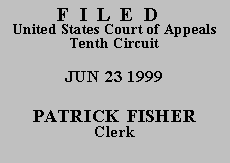

| LARRY JOSEPH SPONSEL,
v.
DONICE NEAL; GALE NORTON,
Attorney General of the State of
Colorado |
No. 98-1402
(D.C. No. 98-B-944) (Colorado) |
Larry Joseph Sponsel appeals from the district court's denial of his petition for a writ of habeas corpus under 28 U.S.C. § 2254. He also moves for a certificate of appealability. For the reasons set out below, we deny the certificate of appealability and dismiss the appeal.
Mr. Sponsel was charged with five felony counts arising out of robbery with a deadly weapon. He had previously been convicted of four felonies, including sexual assault and kidnapping. He was given a psychiatric examination by Dr. Johnson, who concluded that he was not suffering from a mental defect at the time of the crime and that he was competent to stand trial. At the request of his defense attorney, Mr. Sponsel was then examined by a second psychiatrist, Dr. Ann Seig, who concluded that Mr. Sponsel was suffering from Dissociative Disorder which caused him to behave impulsively. She opined that the mental disorder constituted a major mental illness, but she did not conclude either that Mr. Sponsel was insane at the time of the crime or that he was not competent to stand trial. Thereafter, Mr. Sponsel pled guilty to two counts charging him with aggravated robbery and a crime of violence, and not guilty by reason of impaired mental condition to a count charging him with possession of a weapon by a previous offender. Two other counts were dismissed.
The state trial court conducted a very thorough plea examination, questioning Mr. Sponsel closely about the crimes and about his mental problems.
Mr. Sponsel was completely responsive and very articulate throughout the hearing. He made it plain that he understood what he was doing and that he was making the plea of not guilty by reason of impaired mental condition in order to obtain psychiatric treatment for his disorder, which he believed caused him to impulsively commit crimes that he didn't really want to commit. In several instances, he questioned the court to clarify his understanding that he was entitled to apply to the court for reconsideration of the sentence after serving 10 years of his sentence and that the district attorney had agreed not to object to a hearing at that time.
Mr. Sponsel now contends that his guilty plea was involuntary because he was not competent to enter it, and that he had ineffective assistance of counsel when his counsel abandoned an insanity defense for no explainable reason after allegedly obtaining support for it from Dr. Seig's psychatric evaluation. After reviewing the transcript of the guilty plea proceedings and the psychiatric reports, we are persuaded the district court did not err in dismissing Mr. Sponsel's petition without an evidentiary hearing. There is no support in Dr. Seig's report for Mr. Sponsel's contentions that he had an arguable insanity defense or that he was incompetent to stand trial. "'The presence of some degree of mental disorder in the defendant does not necessarily mean that he is incompetent to knowingly and voluntarily enter a plea as well as aid and assist in his own defense.'" Miles v. Dorsey, 61 F.3d 1459, 1472 (10th Cir. 1995)(quoting Wolf v. United States, 430 F. 2d 443, 444 (10th Cir. 1970). Mr. Sponsel's reliance on Genius v Pepe,
50 F.3d 60 (1st Cir. 1995), is unavailing. In that case, defense counsel did not request a second psychiatric report as counsel did here. Moreover, in Genius the defendant had previously been found incompetent to stand trial. Here, defense counsel correctly explored the possibility of an insanity defense and found support lacking after two psychiatric evaluations of Mr. Sponsel. Knowing her client wanted treatment for his mental disorder and that he was facing a very long sentence if tried and convicted on all counts, counsel negotiated both a shorter sentence and the treatment Mr. Sponsel needed.
We substantially agree with the analysis set forth in the Recommendation of United States Magistrate Judge. Because Mr. Sponsel has not "made a substantial showing of the denial of a constitutional right," 28 U.S.C. § 2253(c)(2), we deny his motion for a certificate of appealability and dismiss the appeal.
APPLICATION DENIED; APPEAL DISMISSED.
ENTERED FOR THE COURT
Stephanie K. Seymour
Chief Judge
*.This order and judgment is not binding precedent, except under the doctrines of law of the case, res judicata, or collateral estoppel. The court generally disfavors the citation of orders and judgments; nevertheless, an order and judgment may be cited under the terms and conditions of 10th Cir. R. 36.3.